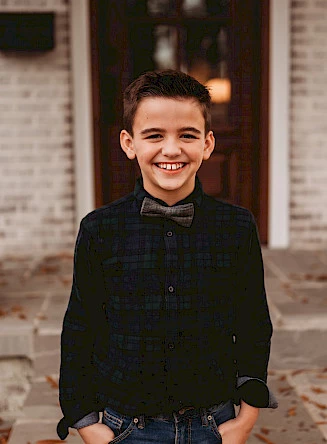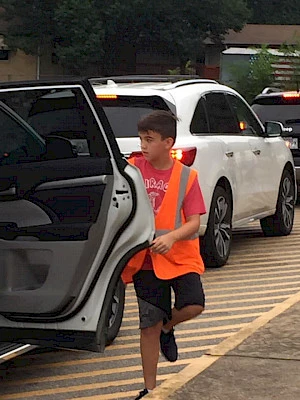Max Fulks’s Journey to Success

By Hannah Fulks
At our 18-month well-child appointment, Max’s expressive vocabulary consisted of two words. Out and Dog.
His receptive vocabulary, what he could understand, was limitless. He could follow simple commands like, “put your shoes on”, “throw this away”, and “give Daddy a hug”.
But if he had to verbalize it, it rarely happened. Instead of words, you’d get a grin.
We were referred to a local place of therapy in Benton and given a diagnosis including low muscle tone and a speech delay.
After four months of speech, our SLP came to us and explained she had seen virtually no improvement and she felt this was because Max had been diagnosed incorrectly. She was convinced our almost two year old had something called, “Childhood Apraxia of Speech.”
I’ll remember her words forever.
Have you ever heard of ACCESS?
It’s in Little Rock.
They have people there that can help.
In the handful of days it took for us to be seen at ACCESS, I worried about everything.
Would they realize how smart he was?
Would they miss something?
Would they really be able to diagnose him in sixty minutes?
How could anyone know my non-verbal baby like I do?
Those worries seem so silly now because I’m on the other side of it. They knew how smart he was. They didn’t miss a thing. They diagnosed him in a matter of minutes.
And maybe most importantly, they did and do know Max Fulks like we know him.
The night we received the official “global childhood apraxia of speech” diagnosis, I cried as I fell asleep. We finally knew. We finally had an answer for what was different about our son. We knew in our hearts it was something, but until we had this diagnosis, we had no plan. And without a plan, we were lost.
As parents, we want our children to be typical. We want them to whisper secrets to their friends. We want them to say their nightly prayers. I even wanted him to argue with his big brother.
And more than anything, I wanted to hear him say, “I love you, Mom.”
When you’re told your child has a communication disorder, that speech will be difficult, your entire world is rocked. Finding ACCESS, finding these therapists and teachers and friends who loved our Max into being, changed the entire course of his life.
After three years of preschool and countless hours of speech, occupational, and physical therapy at ACCESS, our son began kindergarten at a public school in our hometown of Benton.
When I had the difficult meeting with Monika to let her know we wouldn’t be attending kindergarten at ACCESS, she and I made a promise to each other.
She promised she would continue to check on him and wanted to be kept up to date on his progress not only in school, but also with his therapies. I promised I would bring him back to her, back to ACCESS, should I notice any drop off in his education or his speech. She promised me a spot for him should we need one.
I cried leaving the parking lot that afternoon. I cried because I was afraid of new things. I was afraid of sharing Max with the world. His sixyear old voice sounded different. Would they make fun of him? Would they understand him? Was I making a huge mistake?
Four years later, I can look back and laugh. ACCESS prepared our little boy for that big, scary world in a way I didn’t know was possible.
Max sailed through kindergarten, was reading at the top of his class by first grade. Second and third grade came and went and he was educationally and socially exactly where we would want him.

This year, he’s in fourth grade. One of the perks of being the oldest at his elementary school is the chance to be a member of the safety patrol. Safety patrol assists all car riders in the morning and afternoon. They stand in front of the school and open car doors for their peers whose hands are full with lunchboxes, backpacks, and coats. His older brother paved the way a few years ago, and at the time, if I’m honest, I wasn’t sure Max would ever be able to do the same when he was that age.
Yet, here we are.
So many parents will drop their kids off this year and see that little boy and they won’t think a thing about it.
But not me.
I see a kid who had physical and occupational therapy for five years because of low muscle tone. So he can step off that curb and step back up. So he can grasp that door handle of the car. So he can button his safety vest.
I see a kid who has had speech therapy for nine years (and counting) because of childhood apraxia of speech. So he can say, “Good Morning,” “Have a great afternoon,” and “Welcome to school.”
I see a kid who works out at a gym three nights a week to be strong enough to open and close those car doors. To hold umbrellas for the students when it’s raining.
I see teachers, therapists, support staff, and principals who have poured patience, consistency, love, and trust into Max.
You know where the patience and consistency and love and trust began?
At ACCESS.
Those educators and therapists were the first to teach our family that we can do hard things. I learned from them that when the tunnel seems dark, there is always a light. Sometimes it comes in the form of people, sometimes in the form of other students, and sometimes in the form of ourselves.
Max knows his worth today because of those first people who loved him.
If you have a kid who isn’t able to accomplish milestones on the typical schedule, a child who looks different, who sounds different, who walks different, who runs different, know this.
The path takes time and work and sweat and tears and a village. And there is no greater village than of the one we found at ACCESS.